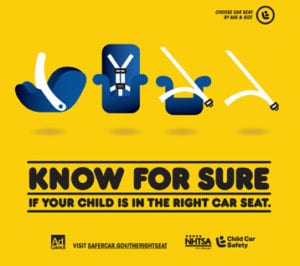
Every day in America, millions of parents and caregivers travel with children in their vehicles. While some children are buckled in properly in the correct car seats for their
ages and sizes – most are not, if they are buckled up at all. According to the U.S. Department of Transportation’s National Highway Traffic Safety Administration (NHTSA), 46 percent of car seats are misused. To help combat this issue, the Wilmington Police Department announced today its participation in Child Passenger Safety Week, a campaign dedicated to helping parents and caregivers make sure their children ride as safely as possible – every trip, every time. Child Passenger Safety Week runs from September 15-21, 2019, and is sponsored by NHTSA. The Wilmington Police Department will use social media to raise awareness of the dangers children face when they are not buckled up properly. The Department will also be extending the hours of its weekly Car Seat Check on September 18.
According to NHTSA, motor vehicle crashes are a leading killer of children, and while fatalities and injuries declined in 2017 from 2016, there is still work to be done to completely eliminate these preventable tragedies. Car seats, booster seats, and seat belts can make all the difference.
Officer Matthew Stavro is the Department Traffic Officer and a Certified Child Passenger Safety Technician. “If your child is going to be in the car, you really have to ensure that it is installed properly,” he said. “If the seat is not used correctly, it’s not going to give your child the protection it is designed to.”
He added that, too often, parents move their children to the front seat before they should, which increases the risk of injury and death even if they are buckled up. “We often get questions from parents of older children asking when a child can ride in the front seat. Although there is no legal age requirement, we recommend that a child sits in the back seat at least until the age of 13.”
According to NHTSA, in 2015, about 25.8 percent of children 4 to 7 who should have been riding in booster seats were prematurely moved to seat belts, and 11.6 percent were unbuckled altogether.
“One of the simplest and most important things a parent or caregiver can do is make sure that the child is in the right car seat for their age and size,” Officer Stavro said. “Even if you think it’s installed correctly, come in and get your car seats checked. A short visit can make certain that the seat is installed correctly, that your kids are in the right seats, and that the seat is being used properly. We hold a weekly Car Seat Check event every Wednesday between 10-2 to help parents and caregivers ensure that their child passengers are as safe as possible.”
NHTSA recommends keeping children rear-facing as long as possible, up to the top height and weight allowed by their particular seats. Once a child outgrows the rear-facing-only “infant” car seat, he/she should travel in a rear-facing “convertible,” or all-in-one car seat. Once your child outgrows the rear-facing size limits, the child is ready to travel in a forward-facing car seat with a harness and tether. After outgrowing the forward-facing car seat with harness, children should be placed in booster seats until they’re the right size to use seat belts safely.
Always remember to register your car seat and booster seat with the car seat manufacturer so you can be notified in the event of a recall. Parents and caregivers can view more information on car seat safety and locate a certified technician at www.nhtsa.gov/carseat.
As part of Child Passenger Safety Week 2019, the Wilmington Police Department will host a Car Seat Check event on Wednesday, September 18, from 10 am – 7 pm. Our certified Child Passenger Safety Technicians will be available to inspect car seats and assist parents and caregivers with the installation of car seats. No appointment is necessary. For more information, contact Officer Matthew Stavro at the Wilmington Police Department at (978) 658-5071.